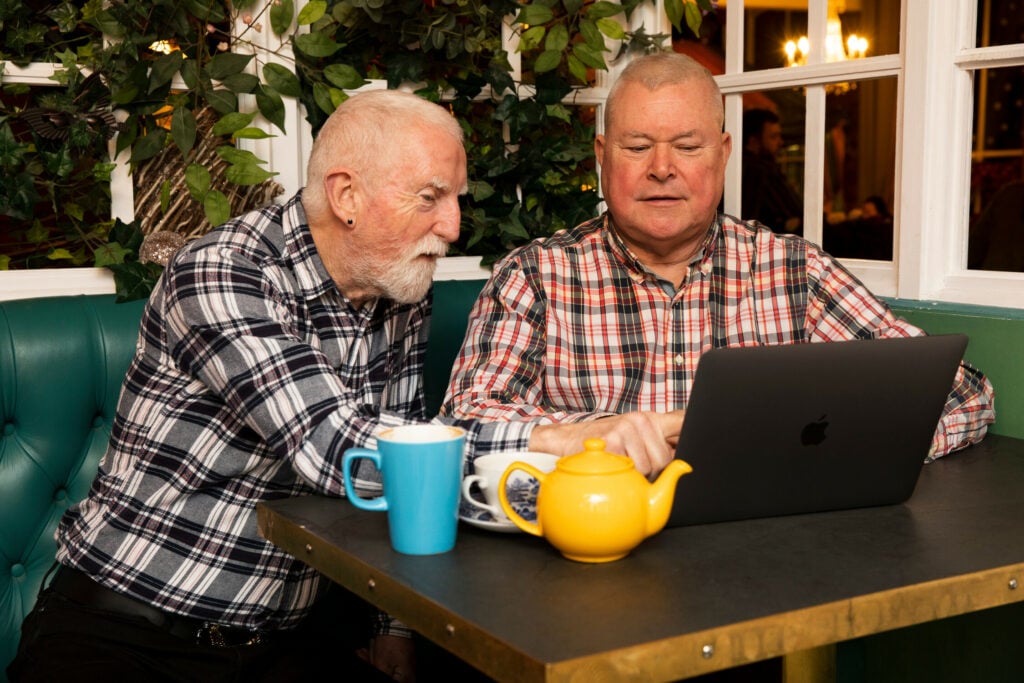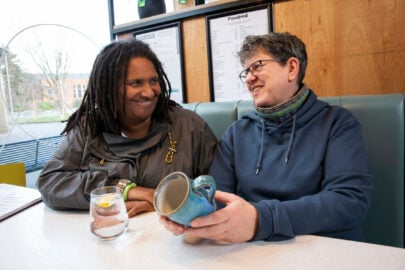
The LGBTQ+ Older Adult Social Care Assessment (LOASCA) study provided detailed knowledge of how adult social care workers consider sexual orientation and gender identity when assessing older people and how older LGBTQ+ people experience assessments.
Funded by the National Institute for Health and Care Research School for Social Care Research (NIHR SSCR), the project was undertaken by the University of Birmingham in collaboration with the University of Manchester, University of Bristol, and Opening Doors, a nation-wide charity offering services to older LGBTQ+ people.
The project team consists of:
- Dr Jason Schaub (project lead, University of Birmingham)
- Dr Paul Willis (University of Bristol)
- Dr Stephen Hicks (University of Manchester)
- Professor Ben Thomas (Opening Doors)
- Dr Dora Jandrić (research fellow, University of Birmingham).
About the LOASCA study
The study used a collaborative process that included eight co-researchers, older LGBTQ+ people with lived experience of social care. These co-researchers undertook a range of research tasks and contributed across the project including: project design, data collection, data analysis, and dissemination, as well as ensuring the project findings were relevant and applicable.
This cross-sectional mixed-methods study used a multiple site case study design to understand:
A) How social care workers engage with issues of SOGI when assessing older LGBTQ+ people with care and support needs.
B) How these service users experience and receive assessments.
Webinar: Understanding how social care assesses older LGBTQ+ people for support
Project outputs
- Community-based graphic report
- A short digital film
- Knowledge exchange webinar
- Academic journal articles
- Conference presentations
- Social care and social enterprise practitioner events
- Practice knowledge brief
- Co-researcher framework.

The CIRCLE project
The CIRCLE research project, led by Dr Jolie Keemink at the University of Kent in collaboration with The Applied Research Collaboration Kent Surrey Sussex, involves various partners such as universities, local authorities in Kent, Surrey, and Sussex, and LGBTQ+ voluntary organiszations like Opening Doors and Switchboard. Funded by the NIHR ARC KSS, the study spanned from October 2022 to September 20234. Its objective is to enhance inclusivity for LGBTQ+ (lesbian, gay, bisexual, trans, queer) residents in residential care facilities catering to individuals aged 50 and above.
Skills for Care LGBTQ+ learning framework
This framework for supporting LGBTQ+ individuals in their later years is designed to establish a foundation for recognising the insights, knowledge, understanding, and skills essential for the social care workforce. The goal is to enable them to engage affirmatively, inclusively, and effectively with people from gender and sexually diverse communities. Dr. Trish Hafford-Letchfield of the University of Strathclyde spearheaded the development of this project in collaboration with the LGBT Foundation, with funding provided by Skills for Care.
The framework describes core knowledge and skills, common and transferable across different types of service provision. It outlined four domains: LGBTQ+ awareness and affirming practice; health and wellbeing in later life; personalised care and support; and leadership, education and service development.
Resources
Short film: Fran’s story
This animated video uses the LOASCA study findings to create a fictional case scenario in which we can observe the impact of hetero/cisnormativity on older LGBTQ+ people’s social care assessments. This video is particularly relevant to social workers, encouraging them to reflect on their own practice. In the video we describe a range of assessment responses to ‘Fran’ an older adult being assessed in her home, and the impact of the social worker’s approaches.
The video depicts a truncated version of a visit to allow for easier viewing. While in a real assessment there would be much more detailed engagements, particularly around some of the issues that Fran raised, this video considers those elements that support LGBTQ+ identities, and not the wider social care issues.
Graphic novel
The LOASCA project sought to understand how social care workers ask about sexual orientation and gender identity in adult social care assessments, hoping to improve social care for older lesbian, gay, bisexual, trans, and queer (LGBTQ+) people. This graphic novel presents some of the stories told by older LGBTQ+ people in the LOASCA study. The graphic novel contains three stories drawn from findings in the study and show how social care workers can help or hinder engagement of older LGBTQ+ people.
About the artist: Domenique Brouwers is a Belgian illustrator based in the north of England. Their work often focuses on bringing overlooked aspects of the human experience to the forefront.
Podcast series
This three-part podcast series looks at collaborative social work research of older people. They are led by Professor Paul Willis from Cardiff University. In the podcasts we hear from older people who have contributed to the LOASCA study and the Social Work with Older People (SWOP) project.
The first episode looks at why we should embark on collaborative research of older people and some of the benefits it brings.
The second episode explores how collaborative research with older people strengthens research.
The third episode considers what makes good, inclusive practice in social work.
LGBT History Month
Older LGBT People and Social Care 2024 conference
The first LGBT History Month Conference took place on 23 February 2024, at The Exchange in Birmingham. The was the first of many in the years to come, showcasing a range of research on the LGBTQ+ community, ethnic minority LGBTQ+ adults, and their experience with social care and residential care.
The Conference brought together academics, practitioners, senior professional leaders, policy makers and older LGBTQ+ people who had been involved in the research studies. The day was dedicated to fostering understanding, awareness, and acceptance of the LGBTQ+ community. This year’s (2024) theme was ‘older LGBTQ+ adults and social care’ and it guided discussions about the progress made, challenges faced, and the road ahead.
Included here are the slides from three of the Conference presentations.
LOASCA
LOASCA is a mixed-method two-and-a-half-year study, funded by the National Institute for Health and Care Research, School for Social Care Research, conducted at the University of Birmingham, and in collaboration with the University of Manchester, Bristol, and Opening Doors. The study investigated the ways social care professionals engage with sexual orientation and gender identity (SOGI) when assessing the care and support needs of older LGBTQ+ people.
CIRCLE
CIRCLE is a two-year research study funded by the National Institute for Health and Care research. The study aims to answer the question ‘how can residential care providers be best supported to provide LGBTQ+ inclusive care?’ by exploring and evaluating three different ways of supporting residential care providers to improve their LGBTQ+ inclusive care offer: pride in care, community of practice, and co-designed resource.
The social care needs of older ethnic minority lesbian, gay, bisexual, trans and queer people
This scoping review of social care needs of older ethnic minority LGBTQ people was carried out by a team of researchers at the University of Manchester. The review was funded by the NIHR School for Social Care Research.
